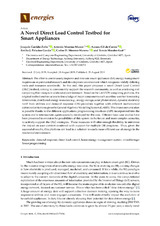A Novel Direct Load Control Testbed for Smart Appliances
Autor
Garrido Zafra, Joaquín
Moreno-Muñoz, A.
Gil-de-Castro, Aurora
Palacios García, Emilio
Moreno Moreno, Carlos Diego
Morales-Leal, Tomás
Editor
MDPIFecha
2019Materia
Demand responseDirect load control
Home energy management system
Mixed-integer linear programming
METS:
Mostrar el registro METSPREMIS:
Mostrar el registro PREMISMetadatos
Mostrar el registro completo del ítemResumen
The effort to continuously improve and innovate smart appliances (SA) energy management requires an experimental research and development environment which integrates widely differing tools and resources seamlessly. To this end, this paper proposes a novel Direct Load Control (DLC) testbed, aiming to conveniently support the research community, as well as analyzing and comparing their designs in a laboratory environment. Based on the LabVIEW computing platform, this original testbed enables access to knowledge of major components such as online weather forecasting information, distributed energy resources (e.g., energy storage, solar photovoltaic), dynamic electricity tariff from utilities and demand response (DR) providers together with different mathematical optimization features given by General Algebraic Modelling System (GAMS). This intercommunication is possible thanks to the different applications programming interfaces (API) incorporated into the system and to intermediate agents specially developed for this case. Different basic case studies have been presented to envision the possibilities of this system in the future and more complex scenarios, to actively support the DLC strategies. These measures will offer enough flexibility to minimize the impact on user comfort combined with support for multiple DR programs. Thus, given the successful results, this platform can lead to a solution towards more efficient use of energy in the residential environment.

